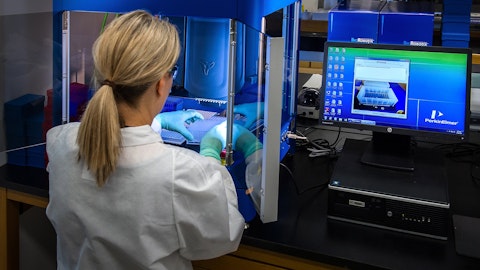Barry Greene: Hey Gary, thanks for the question. So let me take the second part first. As you highlighted, we filed an NDA for both MDD and PPD and we think the data warrant approval for both MDD and PPD. So that’s our current thought at the time and advised as well along with that. In terms of AdCom, that solely is a discretion of the FDA, if the FDA decides, it was around the data and is typical in AdCom’s here from patient if they have advocates to highlight really devastating unmet needs that he’s out there with depression. So we’ll be well prepared if they have an AdCom. If the FDA decides not to hold an AdCom and that’s a signal of a fast approval, we like that too.
Operator: Moving next to Brian Abrahams from RBC Capital Markets.
Brian Abrahams: Hey, guys. Good morning. Thanks for taking my question and congrats on all the progress and on the filing acceptance. I’m curious if you could talk about your latest views on how you might gate the launch focus and investment from targeting psychiatrists initially to ultimately moving and expanding into the primary care setting? Curious, what feedback and metrics you might be looking for it to shape that potential progression? Thanks.
Barry Greene: Yes, Brian, thanks for the question, and thanks to it, congratulations. Glad to hear that you’re as excited as we are. Look, we live in a world of really strong information and have really good knowledge of those healthcare providers that are seeing the depression patients those that are willing to write prescriptions, particularly granted prescriptions. And we advise we’ll focus on where we think we’ll get the strongest patient flow that has the right insurance coverage first and then expand rapidly with success, so that’s the approach we’re taking. We’re certainly to focus on psychiatry and those larger offices irrespective this is when we see a lot of these patients, that will be — that will be our focus.
Chris Benecchi: there is a group of PCPs that you’ll be calling on a teaser PCPs that do behave more like psychiatrists, they see a number of patients with MDD. And we’ll also focus on OBGYNs, but I don’t want the piece about PPD to be lost. And I think as you said it’s very based on the metrics that we have both physician level and patient level data that we have at our disposal, we’re going to make decisions at the right time to continue to scale with success as we look forward.
Barry Greene: Yes, I’d also add Brian that we’re able again in the world we’re living to understand patient activation and kind of patients that are frankly going to absence of rental by name. We believe that that’s going to happen with the drug like this.
Brian Abrahams: Thanks so much.
Operator: Danielle Brill from Raymond James. Your line is open.
Alex Nackenoff: Hey, guys. This is Alex on for Danielle. Thanks for taking our question. So I know you’re not targeting treatment resistant depression in your commercialization strategy. But do you feel that it’s a risk for clinicians to initially trial Zuranolone in their patients that might skew towards this population? Potentially negatively coloring their perceptions of efficacy? In other words, do you think Zuranolone would work in TRD? And just on that front, what’s the gating factors now to initiating formal trials in treatment resistant depression and anxiety bipolar? Thanks.




